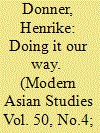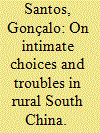|
|
|
Sort Order |
|
|
|
Items / Page
|
|
|
|
|
|
|
| Srl | Item |
| 1 |
ID:
146076


|
|
|
|
|
| Summary/Abstract |
With the exception of a few anthropologists working on gender, much of the recent literature on emerging intimate modernities in South Asia, and the middle class in India in particular, seems to support a view of social relationships evolving in a kind of linear development towards free choice, individualism, and identities based on sexual preference. This imagery is particularly prominent in the representation and self-representation of metropolitan, educated middle-class youths, whose views dominate popular media representations and are associated with secularism, individualism, and independence from family and community. In this article I argue that apart from the ostensibly overwhelming transformations that discourses on coupledom, love, choice and self-realization bring in their wake, new ways of choosing a spouse and of conducting conjugal relations among middle-class urbanites have to be interpreted in relation to much more subtle and long-standing social transformations as well as existing institutional forms, in particular the practical implications of patrilocality and the ideology and reality of the joint family. Based on fieldwork with Bengali-speaking middle-class families in Kolkata spanning two decades, the article charts continuities and subtle shifts in the way ‘love’ and ‘marriage’ are related in conversations, and how young women and their parents negotiate marriage in the context of middle-class consumerism, status competition, and uncertainty.
|
|
|
|
|
|
|
|
|
|
|
|
|
|
|
|
| 2 |
ID:
146078


|
|
|
|
|
| Summary/Abstract |
The article considers narratives and experiences of love marriage in the garment city of Tiruppur in Tamil Nadu, South India. As a booming centre of garment production, Tiruppur attracts a diverse migrant workforce of young men and women who have plenty of opportunity to fall in love and enter marriages of their own making. Based on long-term ethnographic research, the article explores what love marriages mean to those involved, how they are experienced and talked about, and how they shape postmarital lives. Case studies reveal that a discourse of loss of postmarital kin support is central to evaluations of love marriages by members of Tiruppur's labouring classes. Such marriages not only flout parental authority and often cross caste and religious boundaries, but they also jeopardize the much-needed kin support youngsters require to fulfil aspirations of mobility, entrepreneurship, and success in a post-liberalization environment. It is argued that critical evaluations of love marriages not only disrupt modernist assumptions of linear transformations in marital practices, but they also constitute a broader critique of the neoliberal celebration of the ‘individual’ while reaffirming the continued importance of caste endogamy, parental involvement, and kin support to success in India's post-reform economy.
|
|
|
|
|
|
|
|
|
|
|
|
|
|
|
|
| 3 |
ID:
146080


|
|
|
|
|
| Summary/Abstract |
In this article, I examine the seeming paradox of Hindu–Muslim romantic affairs in the wider context of communalism in Gujarat in the wake of the 2002 anti-Muslim violence. At the outset, such affairs appear to embody the most extreme form of taboo, both in their defiance of conventional arranged marriage systems (where caste endogamy and shared religious affiliation play a paramount role) as well as in the wider socio-political context in which Hindus and Muslims are viewed as irreconcilable enemies, or at least oppositional in lifestyle, beliefs, and values. Yet, while media reports in recent years have highlighted similar cases of transgressive liaisons elsewhere in India which have been met with extreme violence, the couplings which I describe in this article, are in practice tolerated by kin and neighbours as an ‘open secret’ which, while public knowledge, has not incurred strong retribution. While love has often been presented as a force for emancipation from the constraints of social conventions and norms in the popular media, I argue that this ‘toleration’ of inter-religious liaisons in the cases I describe suggests the very opposite: namely, that they do not present a significant challenge to entrenched social divisions at the local level.
|
|
|
|
|
|
|
|
|
|
|
|
|
|
|
|
| 4 |
ID:
146077


|
|
|
|
|
| Summary/Abstract |
Drawing on ethnographic data collected in the city of Nanjing, China, the article analyses discursive practices of courtship and marriage in the context of post-Mao and post-Deng economic, social, and legal developments. Informants’ discussions often revolve around the tension between the idea that marriage should be about love and the increasing material demands that prospective grooms face upon marriage in a market-led consumer society. This tension also emerges in media debates on the hedonistic attitude of Ma Nuo, a contestant on the matchmaking programme Feicheng Wurao (If you are the one). Informants, on the other hand, articulate their feelings in terms of family responsibility and pursue marriages that, while based on choice, may also ensure financial stability and parental approval.
|
|
|
|
|
|
|
|
|
|
|
|
|
|
|
|
| 5 |
ID:
146075


|
|
|
|
|
| Summary/Abstract |
Theorists of globalization as well as activists' writing from a range of positions have argued that intimate practices are taking centre stage and becoming part of global discourses in the process. This holds true for the institution of marriage and the associated ideas about appropriate family forms, but also more generally for the ways in which ideas about ‘modern selves’ are realized in relationships based on reflexivity and self-knowledge through engagement with an intimate other.
|
|
|
|
|
|
|
|
|
|
|
|
|
|
|
|
| 6 |
ID:
146081


|
|
|
|
|
| Summary/Abstract |
This article explores how marriage practices and intimate relations are being refashioned in reform-era China in the context of increasingly entangled intersections between private negotiations and public dialogues in law, state policy, science, and the media. Based on long-term field research in impoverished rural areas, the article focuses on the intersections between intimate practices of the everyday and large-scale projects of social engineering aimed at turning ordinary ‘peasants’ into ‘modern civilized citizens’. The article draws particular attention to the important role played by the Birth Planning Policy in shaping local reproductive practices and intimate structures, but the approach developed here to make sense of the impact of globalized neo-Malthusian state interventions on local realities considers also the perspective and the agency of ordinary individuals and communities. Instead of assuming that changes in local practices follow primarily from the impact of external forces such as state policies and technologies of birth planning, the article suggests that local practices and global forces co-produce each other through ‘frictions’ of various kinds. This focus on the micro-macro intersections of what I call here the ‘techno-politics of intimacy’ joins recent efforts in the humanities and social sciences to move beyond conventional top-down approaches to global intimate transformations.
|
|
|
|
|
|
|
|
|
|
|
|
|
|
|
|
| 7 |
ID:
146079


|
|
|
|
|
| Summary/Abstract |
Since the early twentieth century, reforms of the social institution of marriage in China have profoundly curtailed the power of the senior generation to influence the marriage decisions of their offspring. Yet the marriage considerations of graduates from economically deprived rural family backgrounds in China's northwestern Gansu Province reveal a definite impact of feelings of social obligation towards the family as well as of a local understanding of marriage market stratification which (also) reflects these obligations. In this rural region, higher education mainly aims at long-term upward mobility into the formal urban sector of the economy. After all, the basic ‘citizenship divide’ between rural and urban residence rights established by the socialist hukou (household registration) system continues to determine rural families’ structural exclusion from access to various urban resources. Feelings of indebtedness for financial and other support received from parents and family members during years of higher education entangle graduates from economically deprived rural family backgrounds in webs of social relations that oblige them to also consider the interests of others when deciding on whom to marry. When choosing a marriage partner they thus often face dilemmas of negotiating material versus emotional interests, as well as collective versus individual ones. While higher education empowers them to reject others’ interference in their marriage decisions, if they do so, they have to cope with feelings of having disappointed all the hopes their supporters invested in them.
|
|
|
|
|
|
|
|
|
|
|
|
|
|
|
|
| 8 |
ID:
146082


|
|
|
|
|
| Summary/Abstract |
This is a review article of two recent books. The first is D. Venkat Rao's Cultures of Memory in South Asia: Orality, Literacy and the Problem of Inheritance; the second, Vishwa Adluri and Joydeep Bagchee's The Nay Science: A History of German Indology. Rao's conviction is that Indology has failed in its mandate. He claims that Indology so far has produced only European representations of India and not what should have been the choicest self-images of India's past. If Rao begins with a hostile tone towards Indology and expresses his intention to do something with India's texts without either relying on or having recourse to anything that belongs to the Indologist's ragbag, Adluri and Bagchee set out to expose what they refer to as Indology's ‘pretension’ to scientific method and objectivity in their The Nay Science, an unprecedented polemical history of German Indology. I divide this review into two parts: a critical examination of The Nay Science’s critique of German Indology and its commitment to a methodological reform, and a distilled critical account of Cultures of Memory’s approach to Indian textual traditions and the problems of such an approach. Finally, after examining the important challenges facing Indology, I'll make a case for how the philosopher Alasdair MacIntyre may help our understanding of the nature, dynamics, and the relevance of tradition in South Asia.
|
|
|
|
|
|
|
|
|
|
|
|
|
|
|
|
|
|
|
|
|